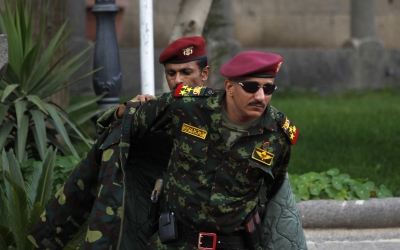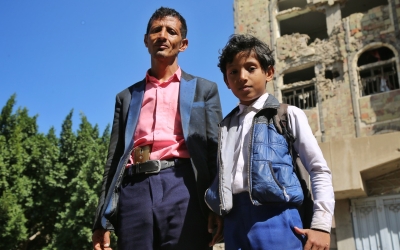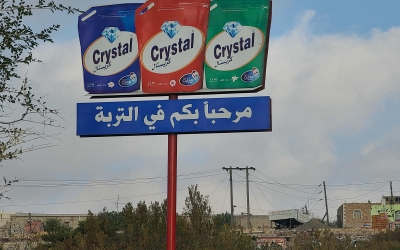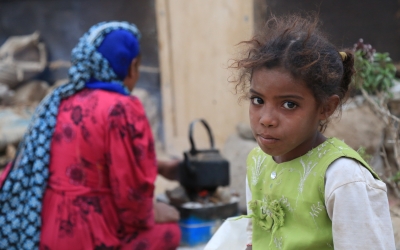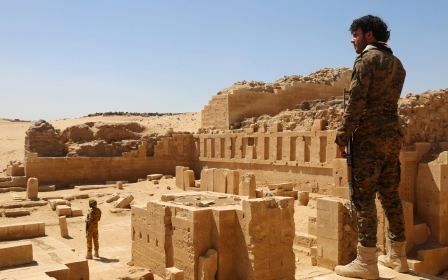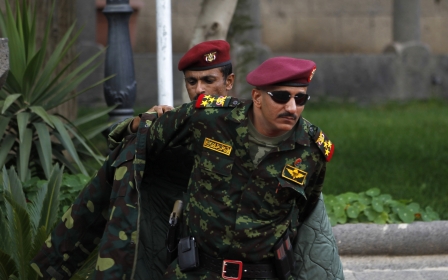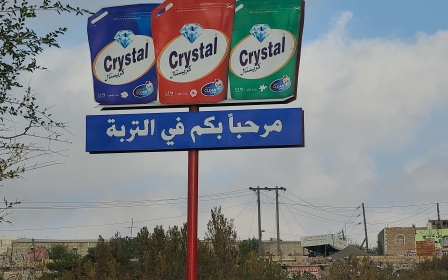Yemen war: Taiz villagers face tough choices as fighters move in
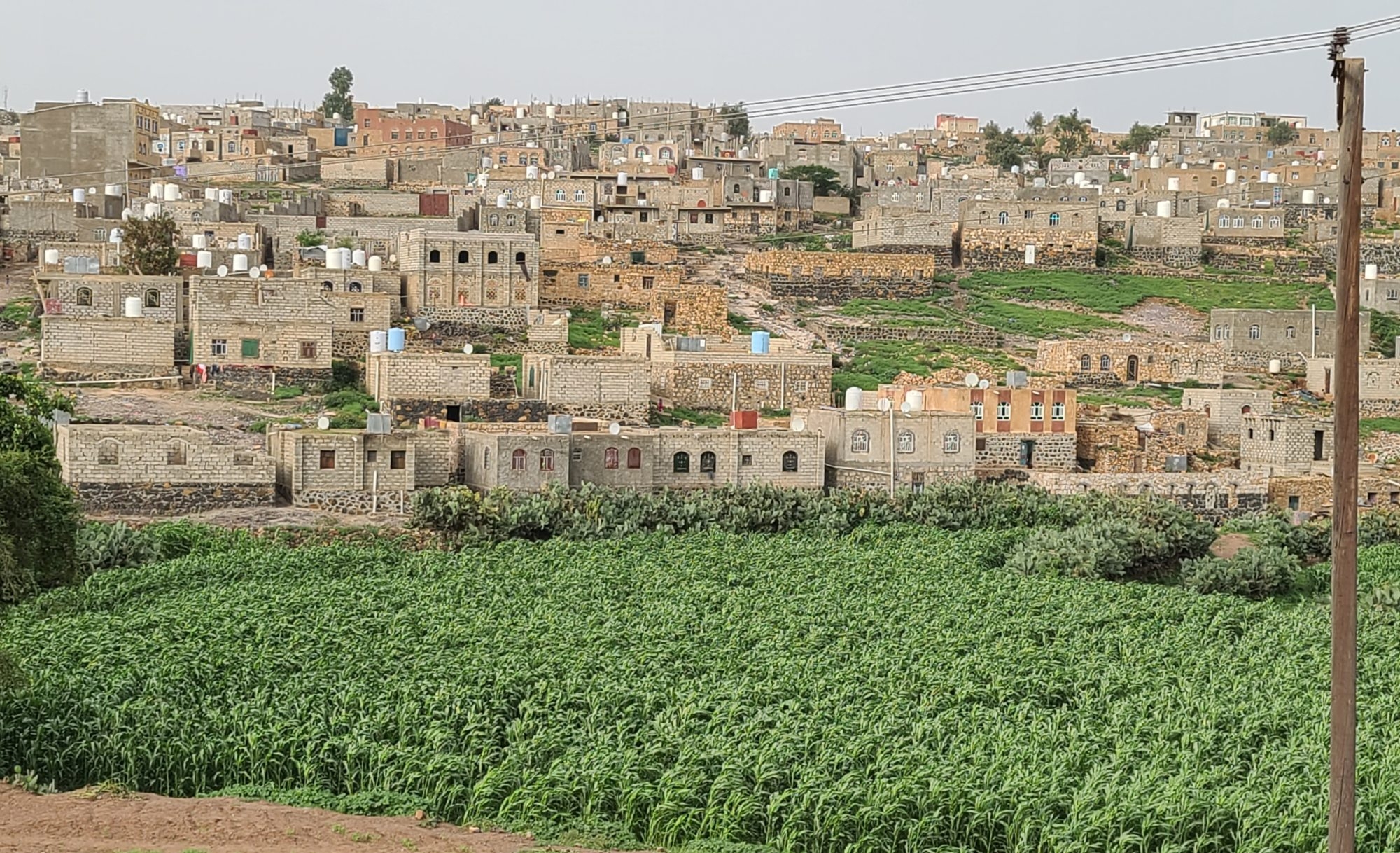
Ahmed Abdulrahim, 51, has worked for decades as a house painter in al-Shimayateen, a district of Yemen’s southwestern Taiz province, but making a living hasn’t always been easy, especially after years of war.
“Even if there is work, the wages aren’t enough to buy all basic necessities for my family - everything is expensive nowadays and I can't afford it,” he told Middle East Eye.
But everything changed for the father of three seven months ago, when new faces came into town.
“A broker from our village came to us and told us that there are fighters fighting on the western coast who are willing to rent our houses and they will pay good rent,” Abdulrahim recalled. “In the beginning we were worried, but we agreed for the sake of money and now we found them to be good people.”
A growing number of fighters under the leadership of Tareq Saleh, the nephew of late Yemeni President Ali Abdullah Saleh, have joined battles against Houthi rebels on the country’s western coast. In the absence of barracks, the fighters are facing a housing crisis of sorts, seeking homes across the region.
Like other villagers in the Taiz countryside, Abdulrahim has opened his home to fighters from far-flung provinces of Yemen. While longtime residents are split on the political and moral ramifications of hosting this new population of renters, one thing is for certain: for better or for worse, the growing community of fighters is changing things in Shimayateen.
An unexpected boon
After hearing from the real estate broker, Abdulrahim divided his house into three smaller units, renting two of them for a total of 70,000 Yemeni rials ($70) each month while he, his wife and children share a single room. By comparison, the average teacher’s salary in Yemen is $60 a month.
In the past, fighters would pay rent in Yemeni rials, but recently villagers have begun asking for payment in Saudi rials or in US dollars, as the local currency has collapsed in more than six years of war.
Backed by the United Arab Emirates (UAE) after 2017, Saleh’s fighters are paid in Saudi rials - a boon for local homeowners.
“Fighters’ salaries are in Saudi rials - they are considered to be rich people, so they don’t hesitate to pay high rents for small houses,” Abdurahim explained.
With more fighters pouring in each day to fight Houthi forces in the Taiz province, demand for housing has been on the rise. Fighters have particularly sought out housing in rural areas, with the belief that villages are safer than cities.
As a result, some homes in Taiz-area villages rent out for more than houses in cities like Sanaa, Taiz and Aden.
“Some houses were abandoned when their owners went to live in cities decades ago, but now owners have returned to rehabilitate those houses and rent them out to fighters,” Abdulrahim said.
“Some rent old houses as they are because there are not enough houses in the village to satisfy demand," he added.
The painter said that the fighters living in his village - many of whom come from the Dhamar governorate - leave their weapons in the city of Mocha, closer to the frontline.
'Villagers opened their homes to displaced people for free because they are victims of the war and that was good behaviour … however, to rent a house to a fighter who kills Yemenis, that is a disaster'
- Atef*, villager
“We are suffering from local fighters who keep shooting in the village without any reason, but the ones from other provinces are polite and they respect us,” he said.
For Abdulrahim, the development has been a positive change.
“Many families were struggling in our village, but now life is easier as they have rented half of their homes and get good incomes,” he said.
“There is no problem when I divide my house with a fighter’s family, but the problem is when I can’t provide my family with all needs.”
Gentrifying the countryside
In many villages of Shimayateen, thousands of fighters from the governorates of Dhamar, Sanaa and Hodeidah have moved in with their families.
Yasin*, a 40-something native of the Dhamar province, left his home last year with his family and joined Tareq Saleh’s forces in the battle on Yemen’s western coast.
“There are tens of thousands of displaced fighters looking for houses in al-Turbah, but there aren’t enough houses for them all, ” he told MEE. “We aren’t happy to pay high rents, but the owners forced our hand because we don’t have any other choice. We can hardly find a house to live in, so we will accept any amount.”
Yasin said returning to Dhamar, currently under Houthi control, was not an option, as he would risk arrest.
The fighter said that the villages in the area of al-Turbah, in Shimayateen, were safe, their mountainous climate similar to what he was accustomed to back in Dhamar.
“The weather on the western coast is very hot and our families can’t live there,” he explained. “We are also from villages, and we don’t enjoy living in cities.”
Both fighters and locals have had to adapt to all the changes brought about by this influx of new inhabitants.
Mohammed Abdullah, a teacher in Shimayateen, said that his village used to be home only to longstanding locals, but that different regional accents and dialects can now be heard in its streets, much like in a city.
“Sometimes, old people can’t understand the fighters who speak different dialects, even if they share the same house,” he told MEE.
Despite the difficulties in fitting in, the fighters have begun to enmesh themselves in the local communities - with some marrying women from the villages of Shimayateen.
Absurd war
But not all villagers are happy about the influx of fighters into their communities.
Atef* used to work in a factory in the city of Taiz until he lost his job in 2015. Since then, he has returned to his village in the Shimayateen area.
“I don’t support any side in this absurd war that has been destroying our country,” he told MEE.
“I’m against renting houses to fighters and bringing them to live in our village... but I have no source of income apart from that,” he added. “Dire need has forced our hand.”
Abdullah believes that villagers have accepted the fighters for the sake of money and nothing else.
“There is community acceptance of pro-Saleh fighters, but that doesn’t mean villagers are supporting [Saleh],” the teacher said. “I can see that even anti-Saleh people from the Islah party have rented their homes to pro-Saleh fighters, so it is clear that people are in dire need and money is what changed their minds.”
Atef doesn’t blame needy villagers either, saying they have had to make their own luck with no one to help them. However, he has harsher words for those who are profiting from the conflict.
“I’m against the rich people who work with both sides of the war, who rent their houses in the village (to pro-Saleh fighters) in US dollars and work with the Houthis in Sanaa,” he said. “I curse those people day and night because they don’t care about their villages.”
Atef said he has no problem with Yemenis from other provinces, but remains staunchly opposed to supporting any side in a war he doesn’t believe in.
“Villagers opened their homes to displaced people for free because they are victims of the war and that was good behaviour,” he said. “However, to rent a house to a fighter who kills Yemenis, that is a disaster.”
*Interviewees request only first names be used
Middle East Eye delivers independent and unrivalled coverage and analysis of the Middle East, North Africa and beyond. To learn more about republishing this content and the associated fees, please fill out this form. More about MEE can be found here.


